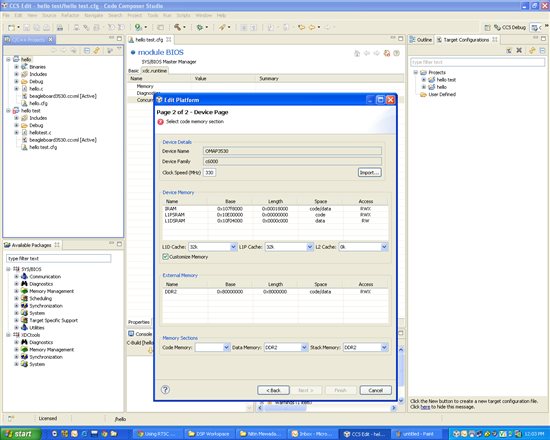Hi, everyone
To move forward in my project, i am now using the RTSC platform on CCSv5.0.2.00006.
Along with this one i am using the OMAP3530 beagleboard, XDS100v2 Emulator, windows XP/windows 7, is that fine?
I debugged the sample hello world program of SYSBIOS, and it works fine.
Now, i want to write my own hello world program in empty RTSC project.
1. I wrote the source file as follows.
#include <xdc/std.h>
#include <xdc/runtime/System.h>
#include <ti/sysbios/BIOS.h>
Void main()
{
System_printf("hello world\n");
BIOS_exit(0);
}
2.Then i created target configuration files and added it, then followed by the .cfg file .
What i did is that i copied the content of the .cfg file of sample to my hello world .cfg file (configuration file should be same) okay.
3. In the RTSC platform wizard i created the my own platform file just b looking in to the target.3530.evm platform, and added it to my plateform.
here is my .cjg file.
var Defaults = xdc.useModule('xdc.runtime.Defaults');
var Diags = xdc.useModule('xdc.runtime.Diags');
var Error = xdc.useModule('xdc.runtime.Error');
var Log = xdc.useModule('xdc.runtime.Log');
var LoggerBuf = xdc.useModule('xdc.runtime.LoggerBuf');
var Main = xdc.useModule('xdc.runtime.Main');
var Memory = xdc.useModule('xdc.runtime.Memory')
var SysMin = xdc.useModule('xdc.runtime.SysMin');
var System = xdc.useModule('xdc.runtime.System');
var Text = xdc.useModule('xdc.runtime.Text');
var BIOS = xdc.useModule('ti.sysbios.BIOS');
var Hwi = xdc.useModule('ti.sysbios.hal.Hwi');
var HeapMem = xdc.useModule('ti.sysbios.heaps.HeapMem');
/*
* Program.argSize sets the size of the .args section.
* The examples don't use command line args so argSize is set to 0.
*/
Program.argSize = 0x0;
/*
* Uncomment this line to globally disable Asserts.
* All modules inherit the default from the 'Defaults' module. You
* can override these defaults on a per-module basis using Module.common$.
* Disabling Asserts will save code space and improve runtime performance.
Defaults.common$.diags_ASSERT = Diags.ALWAYS_OFF;
*/
/*
* Uncomment this line to keep module names from being loaded on the target.
* The module name strings are placed in the .const section. Setting this
* parameter to false will save space in the .const section. Error and
* Assert messages will contain an "unknown module" prefix instead
* of the actual module name.
Defaults.common$.namedModule = false;
*/
/*
* Minimize exit handler array in System. The System module includes
* an array of functions that are registered with System_atexit() to be
* called by System_exit().
*/
System.maxAtexitHandlers = 4;
/*
* Uncomment this line to disable the Error print function.
* We lose error information when this is disabled since the errors are
* not printed. Disabling the raiseHook will save some code space if
* your app is not using System_printf() since the Error_print() function
* calls System_printf().
Error.raiseHook = null;
*/
/*
* Uncomment this line to keep Error, Assert, and Log strings from being
* loaded on the target. These strings are placed in the .const section.
* Setting this parameter to false will save space in the .const section.
* Error, Assert and Log message will print raw ids and args instead of
* a formatted message.
Text.isLoaded = false;
*/
/*
* Uncomment this line to disable the output of characters by SysMin
* when the program exits. SysMin writes characters to a circular buffer.
* This buffer can be viewed using the SysMin Output view in ROV.
SysMin.flushAtExit = false;
*/
/*
* The BIOS module will create the default heap for the system.
* Specify the size of this default heap.
*/
BIOS.heapSize = 0x2000;
/* System stack size (used by ISRs and Swis) */
Program.stack = 0x1000;
/* Circular buffer size for System_printf() */
SysMin.bufSize = 0x400;
/*
* Create and install logger for the whole system
*/
var loggerBufParams = new LoggerBuf.Params();
loggerBufParams.numEntries = 32;
var logger0 = LoggerBuf.create(loggerBufParams);
Defaults.common$.logger = logger0;
Main.common$.diags_INFO = Diags.ALWAYS_ON;
System.SupportProxy = SysMin;
Here is the my platform wizard screenshot,

When i am building my project, i had some errors in the error log, which are something like this.
Description Resource Path Location Type
cannot find file "./configPkg/linker.cmd" hello test C/C++ Problem
errors encountered during linking; "hello test.out" not built hello test C/C++ Problem
Linking failed. Check the Console window for details. hello test Unknown C/C++ Problem
unresolved symbol _ti_sysbios_BIOS_exit__E, first referenced in ./hellotest.obj hello test C/C++ Problem
unresolved symbol _xdc_runtime_System_printf__E, first referenced in ./hellotest.obj hello test C/C++ Problem
creating ".stack" section with default size of 0x400; use the -stack option to change the default size hello test C/C++ Problem
Also attaching the project file
Here i had attached the all the necessary details of project. If anybody what's going wrong here, then please let me know.
Regards,
Nitin Mewada

